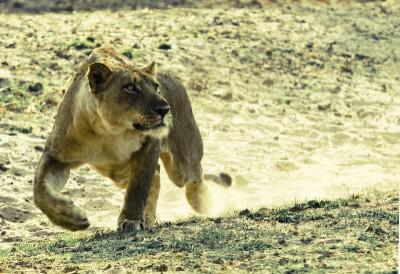Zambia Bans Lion And Leopard Hunting, As Big Cats Disappear

The government of Zambia has placed a ban on the hunting of lions and leopards, citing that their numbers have declined precipitously in recent years.
Sylvia Masebo, the country’s tourism minister, said the rapid decline in the big cat population would hurt tourist revenues, and that there are simply not enough of the wild felines left to allow hunting them.
"Tourists come to Zambia to see the lion, and if we lose the lion, we will be killing our tourism industry," she told Reuters, adding that it makes more sense to encourage visitors to view game in the wild, rather than engage in blood sport to kill them.
Safari hunting, she asserted, did not generate enough revenue to make it a worthwhile endeavor.
"Why should we lose our animals for $3 million a year? The benefits we get from tourist visits are much higher," she added.
Speaking to Agence France Presse, Masebo declared: "We do not have enough cats for hunting purposes, especially if we have to save our national resource. The cats are gone, and no amount of convincing from any sector or group will convince me otherwise.”
The BBC reported that there are an estimated 4,500 lions in the southern African country, while the leopard population is unknown.
On the whole continent of Africa, the International Union for Conservation of Nature stated, no more than 30,000 lions remain, largely due to conflicts with encroaching human settlements, and the gradual loss of prey and habitat.
LionAid, a British conservation society, said lions are now extinct in 25 African countries and nearly extinct in another 10. Fifty years ago, the continent had more than 200,000 of the big cats roaming around.
Zambia’s neighbor Botswana has already enacted legislation to prohibit all sport hunting starting next year. Kenya banned sport hunting as long ago as 1977.
However, while conservationists are surely pleased by Zambia’s ban on lion hunting, not everyone in the country is happy about it.
According to the Zambian Watchdog newspaper, an unnamed close associate of Masebo said she acted “emotionally” in imposing the ban.
“Masebo is a puppet of individuals like Yousuf Zumla, who is her chief advisor and has [a] personal agenda to settle old [scores] with competitors and has been using his relationship with Masebo, not knowing that he is harming the entire sector,” the person close to Masebo said.
The Watchdog quoted this person as saying that scientific data showing that the big cat population is an endangered species is lacking. He also warned that a ban on hunting would hurt the country economically.
“Income levels of [the Zambia Wildlife Authority] ZAWA will go down since most of its income originates from [activities related to the] lion and leopards,” the source told the Watchdog.
“This will certainly have an effect on community income … and employment levels will [be reduced]. As a result, poaching levels will rise.”
A safari tour operator also complained about the ban.
“We have clients with booked safaris for [the] 2013 hunting season and many other inquiries as well. The move will make Zambia an unpopular hunting destination,” he said.
Similarly, Gavin Robinson of the Professional Hunters Association of Zambia, criticized the hunting halt.
“People in Europe and America wish to hunt, and with [this ban happening], Zambia will lose income,” Robinson said.
According to the Zambia Tourism Board (ZTB), a little more than 900,000 tourists visited the country in 2011, up from 815,000 arrivals in 2010. The board had planned to spend 9.8 billion Zambian Kwacha (about $19 million) in marketing to raise the tourist figure to 1-million for 2012.
© Copyright IBTimes 2024. All rights reserved.





















